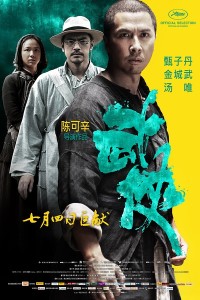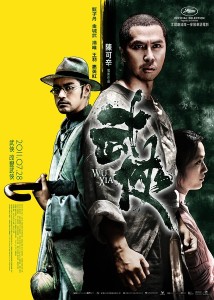Wu Xia
武侠
Hong Kong/China, 2011, colour, 2.35:1, 111 mins. (Cannes premiere version), 114 mins. (Asia version).
Director: Chen Kexin 陈可辛 [Peter Chan].
Rating: 8/10.
Sumptuously shot spin on the costume action genre has good performances but a slightly bumpy script.
Liu Family village, Yunnan province, southern China, Jul 1917. Liu Jinxi (Zhen Zidan) lives a quiet life with his wife Yu (Tang Wei) and their two young sons Xiaotian (Li Jiamin) and Fangzheng (Zheng Wei). Liu runs a paper mill, and the village has prospered since he arrived. One day two fugitives arrive demanding money and, after a long fight with Liu, both end up dead. The bigger one is identified as Yan Dongsheng (Yu Kang), an especially powerful fighter. Liu becomes a local hero but detective Xu Baijiu (Kaneshiro Takeshi), an expert in physiology and pressure points, is puzzled how a seemingly ordinary man like Liu was able to defeat two hardened fugitives – and by using specialised martial-arts techniques.  He discovers Liu arrived in the village five years earlier, when Yu was already pregnant with her first son by her first husband, and was adopted into the Liu clan. Liu’s original name was rumoured to be Gong, and his father a butcher in Jingzhou. Liu finally tells Xu that he was actually a convicted killer and spent 10 years in Jingzhou prison. But Xu, who’s noticed that Liu is surrounded by a powerful qi force-field, is still suspicious, and when an associate (Jiang Wu) reports back from his investigations in Jingzhou, he realises Liu is actually Tang Long, second-in-command of the murderous 72 Demons gang and the favourite son of its Tangut leader (Wang Yu) and his wife (Hui Yinghong).
He discovers Liu arrived in the village five years earlier, when Yu was already pregnant with her first son by her first husband, and was adopted into the Liu clan. Liu’s original name was rumoured to be Gong, and his father a butcher in Jingzhou. Liu finally tells Xu that he was actually a convicted killer and spent 10 years in Jingzhou prison. But Xu, who’s noticed that Liu is surrounded by a powerful qi force-field, is still suspicious, and when an associate (Jiang Wu) reports back from his investigations in Jingzhou, he realises Liu is actually Tang Long, second-in-command of the murderous 72 Demons gang and the favourite son of its Tangut leader (Wang Yu) and his wife (Hui Yinghong).
REVIEW
Part period detective mystery, part martial arts drama, and part pressure-points manual, Wu Xia 武侠 is a sumptuously shot spin on the costume action genre whose only major weakness is a lack of narrative smoothness and tonal consistency. The first directorial outing by Hong Kong director-producer Chen Kexin 陈可辛 [Peter Chan] since his 2007 costume epic The Warlords 投名状 (2007), the movie plays into the current mini-wave of period Asian detective movies (Detective Dee and the Mystery of the Phantom Flame 狄仁杰之通天帝国, 2010; Detective K: Secret of Virtuous Widow 조선명탐정 각시투구꽃의 비밀, 2011) while presenting a fairly familiar plot in a fresh way.
The film’s totally generic Chinese title – literally, “Martial Arts Chivalry”, the equivalent of calling a US cowboy movie simply Western – leads one to expect a kind of ultimate statement on martial arts cinema. Instead, the script by Hong Kong’s Lin Aihua 林爱华 [Aubrey Lam] and Chen Jiayi 陈嘉仪 takes a subject that’s formed the basis of everything from gongfu movies in the East to Westerns and gangster films in the West – a man settled in a new life finds his violent past catching up with him – to dissect the mechanics of martial-arts techniques rather than the chivalrous nature of its exponents.
There’s very little that’s chivalrous about either the lead character, a seemingly peaceful paper-maker, or the fight scenes, which range from rough-and-tumbles in an inn and, later, a cattle stall to a frantic roof-top chase and a brutish, claustrophobic battle at the end in the main character’s home. The superb soundtrack, full of clanking metallic noises and other graphic sounds, gives the fights an immediacy and graphic “realism” which is matched by the earthy sets of Hong Kong p.d. Xi Zhongwen 奚仲文 [Yee Chung-man] and the saturated photography by Jake Pollack 包轩鸣 and Li Yaohui 黎耀辉 [Lai Yiu-fai] of the Yunnan locations. The movie’s natural but atmospheric sense of place, heightened by things like the adoption by actor Kaneshiro Takeshi 金城武 of a strong Yunnan accent, is one of the movie’s highlights, and helps to sustain the drama even when the film’s tone wavers and the script’s development is sometimes bumpy.
Chen shows an understanding of the limitations of Zhen Zidan 甄子丹 [Donnie Yen] as an actor and uses them to the film’s advantage, focusing his character on either mild-mannered behaviour or whiplash action, with Kaneshiro’s bespectacled, “scientific” investigator providing the film’s humour and sense of enquiry. In that respect, Wu Xia is very much a shared movie, and the chemistry between the two is okay when together on screen. Caught between the two, Tang Wei 汤唯 doesn’t have a great deal to do as the wife of Zhen’s character but she does it with grace and looks cute in Yunnanese peasant garb. For genre fans, the appearances of the legendary Wang Yu 王羽 [Jimmy Wang], now 68, and the semi-legendary Hui Yinghong 惠英红 [Kara Hui], now 51, in two memorable fight scenes in the second half bring a real heft to the movie’s action credentials, as well as providing an opportunity for a reference to Wang’s 1967 Shaw Brothers classic The One-Armed Swordsman 独臂刀 [of which it was originally intended to be a remake].
The varied score, by three composers, works well in the action sequences and in lighter moments underscoring village life, and the device of bookending the film with similar sequences provides Tang with some of her best moments, especially at the quietly touching end. Less use of computer graphics to show the internal bodily results of martial arts techniques would benefit the film.
In some territories the film may also be released under the flat-sounding title Dragon. [In the US, it was, in Nov 2012, in a 98-minute version.] The 111-minute version reviewed here was specially prepared for the film’s Midnight Screening world premiere at Cannes, and is unlikely to be seen in exactly that same form again. For Asian release, Chen slightly re-edited the movie, cutting back heavily on the computer graphics mentioned above and making other tiny adjustments and additions. Overall, this version has a more natural flow, despite being only a couple of minutes longer.
CREDITS
Presented by Stellar Mega Films (CN), We Pictures (HK), Dingsheng Cultural Industry Investment (CN), JSBC Eudemonia Blue Ocean TV & Movie Group (CN), Yunnan Film Group (CN). Produced by We Pictures (HK).
Script: Lin Aihua [Aubrey Lam], Chen Jiayi. Photography: Jake Pollock, Li Yaohui [Lai Yiu-fai]. Editing: Xu Hongyu [Derek Hui]. Music: Chen Guangrong [Comfort Chan], Jin Peida [Peter Kam], Chatchai Pongprapaphan. Production design: Xi Zhongwen [Yee Chung-man]. Art direction: Sun Li. Costume design: Wu Lilu [Dora Ng]. Sound: Lu Ke, Nopawat Likitwong, Traithep Wongpaiboon. Action: Zhen Zidan [Donnie Yen]. Action direction: Yan Hua, Tanigaki Kenji. Visual effects: Weng Guoxian (Digital Idea, yinyung.co).
Cast: Zhen Zidan [Donnie Yen] (Liu Jinxi; Tang Long), Kaneshiro Takeshi (Xu Baijiu), Tang Wei (Yu, Liu Jinxi’s wife), Wang Yu [Jimmy Wang] (Master), Hui Yinghong [Kara Hui] (Master’s wife), Jiang Wu (Xu Baijiu’s investigator), Li Xiaoran (Xu Baijiu’s ex-wife), Li Jiamin (Xiaotian), Zheng Wei (Fangzheng), Yu Kang (Yan Dongsheng, killer), Tanigaki Kenji (Yan Dongsheng’s associate), Yin Zhusheng, Wang Jinsong, Zhou Bo.
Premiere: Cannes Film Festival (Out of Competition, Midnight Screening), 13 May 2011.
Release: China, 4 Jul 2011; Hong Kong, 28 Jul 2011.
(Review originally published on Film Business Asia, 15 May 2011.)
